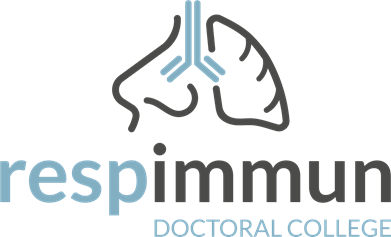
respimmun.at
• Böhm
• Brčić
• Heinemann
• Höfler
• Kargl
• Kwapiszewska
Leithner ⏩
• Marsche
• Marsh
•Moissl-Eichinger
• Olschewski A
• Olschewski H
• Strobl
• Tomazic
• Brčić
• Heinemann
• Höfler
• Kargl
• Kwapiszewska
Leithner ⏩
• Marsche
• Marsh
•
• Olschewski A
• Olschewski H
• Strobl
• Tomazic


The RESPImmun Faculty

|
Katharina LEITHNER, MD, PhDGluconeogenesis in tumor-promoting macrophages |
|
Division of Pumonology, Department of Internal Medicine; Medical University of Graz,
Auenbruggerplatz 15, A-8036 Graz
| |
| websites: [RESPImmun] [MUG] | |
| • Profile ⏬ • Curriculum vitae • PhD students • Grants • Publications | |
Katharina Leithner completed her MD in 2000 and PhD in Molecular Medicine in 2014. The main aim of
her newly founded research group is to explore why aberrant activation of this metabolic pathway enables cancer
cells to grow in their harsh microenvironment and how cancer cell metabolic adaptation can be therapeutically
exploited. Furthermore, the group is interested in mechanisms of metabolic co-operation of malignant and
non-malignant cells (
Project
Project 10: Gluconeogenesis in tumor-promoting macrophagesCo-PI: Jörg Lindenmann
Background
Macrophages are recruited and re-programmed by tumor cells to acquire a pro-tumorigenic phenotype, the so-called M2 phenotype. Cancer cells as well as accompanying non-neoplastic cells, like macrophages, reside in a largely nutrient-poor microenvironment. Adaptation of cancer cells to a decline in glucose concentrations involves the activation of the reverse pathway of glycolysis, gluconeogenesis, to generate crucial biosynthetic intermediates from non-carbohydrate precursors, like lactate, as shown by our group and subsequently by others. The initial gluconeogenesis enzyme, phosphoenolpyruvate carboxykinase (PEPCK, PCK2, the mitochondrial isoform) is functionally expressed in lung cancer cells, enhances tumor cell survival under glucose deprivation and is necessary for growth of lung cancer xenografts beyond a microscopic size. We found abundant PCK2 also in lung cancer-associated macrophages as well as normal, alveolar macrophages, however its function in these cells is unknown.Hypothesis and objectives
We hypothesize that PCK2 mediates a yet undescribed pathway in M2 polarized macrophages that allows the flexible use of tumor cell-derived lactate and other precursors for biosynthetic purposes. PCK2-dependent biosynthetic activity might be critical for the tumor-promoting phenotype of macrophages in a nutrient-deprived environment and might be required to support glucose starved cancer cells. Our specific aims to clarify the role of PEPCK (PCK2) in tumor-promoting macrophages are as follows. To interfere with adaptive processes of cancer cells and their accompanying tumor-promoting normal cells under nutrient deprivation might be an effective therapeutic approach in poorly nourished cancers. The present study will shed light on the role PEPCK (PCK2), a key mediator of biosynthetic flexibility, in tumor-promoting macrophages and answer the question, whether this enzyme is needed for the exchange of metabolites between macrophages and tumor cells.Methodology
Input from collaborations within the RESPImmun programme
- Julia Kargl will contribute to the project with her expertise in tumor immunology and isolation of macrophages,
- Ákos Heinemann will assist with in vitro differentiation of monocyte-derived macrophages and their phenotyping under glucose starvation,
- Leigh Marsh will provide help with PCK2 knockout mice breeding.